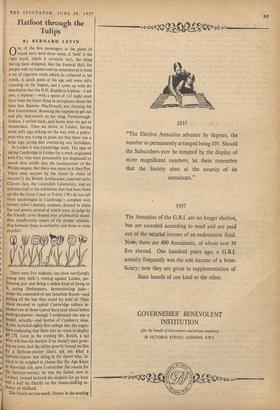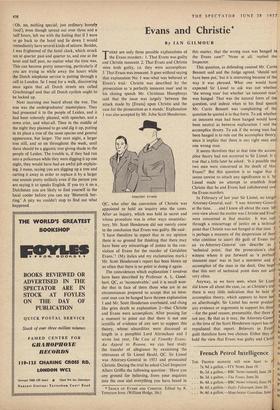Flatfoot through the Tulips
By BERNARD LEVIN ONE of the five passengers in the plane (it would have held three more, if 'held' is the right word, which it certainly isn't, the thing having been designed, like the Festival Hall, for people with no knees) said he remembered it from a set of cigarette cards which he collected in his youth. A quick guess at his age and some nifty counting on, the fingers, and I came up with the Conclusion that the D.H. Rapide (a biplane—I ask you, a biplane!—with a speed of 115 mph) must have been the latest thing in aeroplanes about the time that Ramsay MacDonald was forming his first Government. Resisting the impulse ,to get out and play hop-scotch on the wing, Farnborough- fashion, I settled back, and hours later we got to Amsterdam. Then we drove to Leiden, having some jolly sign-talking on the way with a police- man who was trying to point out that there was a large sign saying that overtaking was forbidden.
In Leiden it was Cambridge week. The idea of taking Cambridge to Leiden for a week originated with Pye, who were presumably not displeased to march thus boldly into the headquarters of the Philips empire. But there was more to it than Pye. There were mayors by the dozen (a chain of mayors?), the British Ambassador, assorted earls, Chivers Jam, the Cavendish Laboratory, and an entrance hall in the exhibition that had been fitted up like the Great Court at Trinity (We do not call them quadrangles in Cambridge') complete with earnest tailor's-dummy students, dressed in white ties and gowns, several of which were, to judge by the friendly arms draped over professorial shoul- ders, insufficiently aware of the proper relation- ship between those in authority and those in statu pupilluri.
There were live students, too (how terrifyingly Young they look!), rowing against Leiden, per- forming jazz and doing a sedate kind of jiving to H, acting Shakespeare, demonstrating judo— Under the command of one Jonathan Routh—and Pulling all the legs they could lay hold of. Their stand devoted to typical Cambridge culture in- cluded one of those typical hard (and often) bitten undergraduettes—though I understand she was a Model, actually—and bottles of Camberry wine. It also included eighty-five college ties, the organ- isers explaining that there was no room to display all 279. Later in the evening Mr. Routh, a lad Whe will lose his shadow if he doesn't start grow- ing up soon, had the tables smartly turned on him by a harbour-master (don't ask me What a harbour-master was doing in the show) who, in- vited to be weighed in cheese like the Aga Khan in diamonds '(Oh, now I remember the reason for the harbour-master; he was the fattest man in Leiden), instead lectured the students for an hour and a half (in Dutch) on the cheese-making in- dustry of Holland.
The Dutch eat too much. Dinner in the evening ('Oh. no, nothing special; just ordinary homely food'), even though spread out over three and a half hours, left me with the feeling that if I were to go back to the hotel and lie down I would immediately have several kinds of seizure. Besides, I was frightened of the hotel clock, which struck ten at quarter past and quarter to, and one at the hour and half past, no matter what the time was. This can become pretty unnerving, particularly if you are trying to while away the hours while the Dutch telephone service is putting through a call to London. So I went for a walk, discovering once again that all Dutch streets are called Grachtsingel and that all Dutch cyclists ought to be locked up.
Next morning one heard about the tree. The tree was the undergraduates' masterpiece. They had presented it to the people of Leiden, and it had been solemnly planted, with speeches, and a town crier, and what-all. Then in the middle of the night they planned to go and dig it up, putting in its place a tree of the same species and general appearance, but larger. The next night, a larger tree still, and so on throughout the week, until there should be a gigantic tree giving shade to the people of Leiden. The trouble is, if they had run into a policeman while they were digging it up one night, they would have had an awful job explain- ing. I mean, saying you are digging up a tree and carting it away in order to replace it by a larger one sounds pretty unlikely even if the person you are saying it to speaks English. If you try it on a Dutchman you are likely to find yourself in the local cooler before you can say 'Bismarck her- ring.' A pity we couldn't stop to find out what happened.



































 Previous page
Previous page